★★★
“Joan’s eminent originality was her common sense”
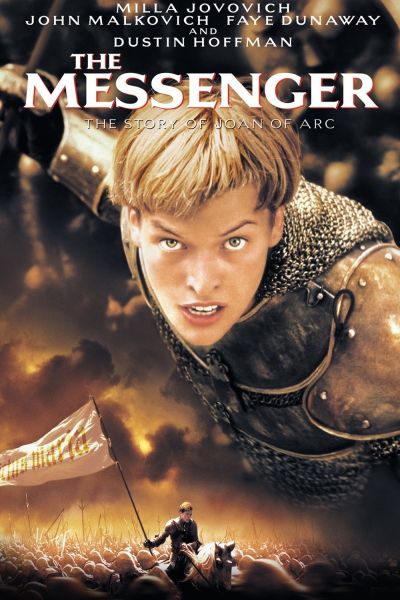 This was the the very first sentence of Michelet’s classic biography, published in 1853, but you’d be hard pressed to recognise the same person in Besson’s portrayal. A more accurate summary of this Joan would be the line spoken to her as she languished in prison: “You didn’t see what was, Jeanne – you saw what you wanted to see…” Besson comes down firmly in the school of thought which has Joan as a mentally deranged religious loony. While this is a viable theory, it doesn’t work as played by Jovovich – all twitchy, rolling her eyes and staring off into the distance – since it becomes impossible to see why anyone would have followed her. Unless we assume the 14th century French population were entirely gullible, she should have spent her life quietly as some village’s idiot. This cripples the film irreperably, since we feel little or no sympathy for a heroine depicted as a frothing zealot.
This was the the very first sentence of Michelet’s classic biography, published in 1853, but you’d be hard pressed to recognise the same person in Besson’s portrayal. A more accurate summary of this Joan would be the line spoken to her as she languished in prison: “You didn’t see what was, Jeanne – you saw what you wanted to see…” Besson comes down firmly in the school of thought which has Joan as a mentally deranged religious loony. While this is a viable theory, it doesn’t work as played by Jovovich – all twitchy, rolling her eyes and staring off into the distance – since it becomes impossible to see why anyone would have followed her. Unless we assume the 14th century French population were entirely gullible, she should have spent her life quietly as some village’s idiot. This cripples the film irreperably, since we feel little or no sympathy for a heroine depicted as a frothing zealot.
Historically too, it gets off to a bad start – an entirely fabricated incident in which Joan sees her sister first killed, then raped by an English soldier. This provides a spurious ground for Joan to hate the invaders, when contemporary accounts tell of her concern being almost equal for both sides. Also made-up is her finding a sword in a field, and there is a sudden leap, with Joan arriving to an audience with the King – in truth, she talked her way up the hierarchy. A rather lurid scene (missing from the US theatrical release) where Joan’s virginity is verified, marks the end of a troubling first act. Once her campaign begins, though, the film improves drastically, with excellent (if somewhat implausible – did they really use something resembling helicopter rotors as weapons?) battle scenes, that are at once enthralling and grim. It’s understandable when they unhinge Joan’s sanity even more; another of the themes seems to be that her mission was really non-Christian, in that it led to the deaths of so many people. Something about “thou shalt not kill”, though given the bloody history of Christianity, singling her out seems somewhat unfair. Tcheky Karyo delivers a fine performance as the leader of Joan’s army, facing the difficult task of balancing her expectations, with prosaic things like, oh, not getting killed.
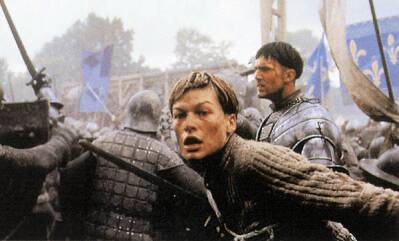 Joan’s capture, trial and execution are fairly close to the truth, though in reality, the King was less involved and more concerned for Joan than shown. It certainly is reasonable to suggest that a naive innocent such as Joan would have been used for political ends. Once she’d outlasted her usefulness – and with the king on the throne, she quickly became more a hindrance than a help – she would have needed to be disposed of. Must confess, I quite like the concept of Joan as a medieval version of Lee Harvey Oswald. Dustin Hoffman’s appearance as Joan’s conscience is another neat touch, and his sarcasm works well. Indeed, the film is one good performance from being excellent. The bad news is, it’s Jovovich who is the culprit (a messenger who deserves to be shot?), though Besson and co-writer Andrew Birkin perhaps warrant most of the criticism for twisting facts and characters in order to fit a predetermined goal. Their Joan is so far from the historical record, they’d have been better off placing their character in an entirely fictitious setting.
Joan’s capture, trial and execution are fairly close to the truth, though in reality, the King was less involved and more concerned for Joan than shown. It certainly is reasonable to suggest that a naive innocent such as Joan would have been used for political ends. Once she’d outlasted her usefulness – and with the king on the throne, she quickly became more a hindrance than a help – she would have needed to be disposed of. Must confess, I quite like the concept of Joan as a medieval version of Lee Harvey Oswald. Dustin Hoffman’s appearance as Joan’s conscience is another neat touch, and his sarcasm works well. Indeed, the film is one good performance from being excellent. The bad news is, it’s Jovovich who is the culprit (a messenger who deserves to be shot?), though Besson and co-writer Andrew Birkin perhaps warrant most of the criticism for twisting facts and characters in order to fit a predetermined goal. Their Joan is so far from the historical record, they’d have been better off placing their character in an entirely fictitious setting.
Dir: Luc Besson
Star: Milla Jovovich, John Malkovich, Faye Dunaway, Tcheky Karyo
 This is one of those Hong Kong movies which seems to believe that if they cram in enough complications and characters, you’ll overlook the deficiencies. They’re kinda right: if you can let go (I did, Chris couldn’t), you will enjoy this a whole lot more, though here, it’d take five times as much plot to make you ignore the truly woeful titular bird. There would seem to have been confusion in the prop department over whether the request for a “giant crane” meant a bird or a piece of construction equipment: it looks as if they split the difference, building something with feathers, which remains (painfully) obviously mechanical.
This is one of those Hong Kong movies which seems to believe that if they cram in enough complications and characters, you’ll overlook the deficiencies. They’re kinda right: if you can let go (I did, Chris couldn’t), you will enjoy this a whole lot more, though here, it’d take five times as much plot to make you ignore the truly woeful titular bird. There would seem to have been confusion in the prop department over whether the request for a “giant crane” meant a bird or a piece of construction equipment: it looks as if they split the difference, building something with feathers, which remains (painfully) obviously mechanical.





 Joan’s capture, trial and execution are fairly close to the truth, though in reality, the King was less involved and more concerned for Joan than shown. It certainly is reasonable to suggest that a naive innocent such as Joan would have been used for political ends. Once she’d outlasted her usefulness – and with the king on the throne, she quickly became more a hindrance than a help – she would have needed to be disposed of. Must confess, I quite like the concept of Joan as a medieval version of Lee Harvey Oswald. Dustin Hoffman’s appearance as Joan’s conscience is another neat touch, and his sarcasm works well. Indeed, the film is one good performance from being excellent. The bad news is, it’s Jovovich who is the culprit (a messenger who deserves to be shot?), though Besson and co-writer Andrew Birkin perhaps warrant most of the criticism for twisting facts and characters in order to fit a predetermined goal. Their Joan is so far from the historical record, they’d have been better off placing their character in an entirely fictitious setting.
Joan’s capture, trial and execution are fairly close to the truth, though in reality, the King was less involved and more concerned for Joan than shown. It certainly is reasonable to suggest that a naive innocent such as Joan would have been used for political ends. Once she’d outlasted her usefulness – and with the king on the throne, she quickly became more a hindrance than a help – she would have needed to be disposed of. Must confess, I quite like the concept of Joan as a medieval version of Lee Harvey Oswald. Dustin Hoffman’s appearance as Joan’s conscience is another neat touch, and his sarcasm works well. Indeed, the film is one good performance from being excellent. The bad news is, it’s Jovovich who is the culprit (a messenger who deserves to be shot?), though Besson and co-writer Andrew Birkin perhaps warrant most of the criticism for twisting facts and characters in order to fit a predetermined goal. Their Joan is so far from the historical record, they’d have been better off placing their character in an entirely fictitious setting.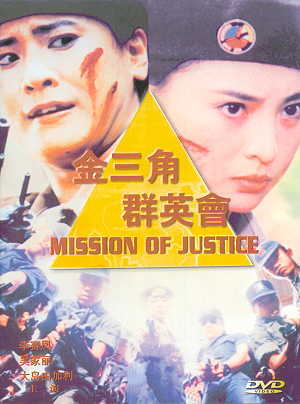 I hoped for more from a pairing of Lee and Oshima, each having done fine work individually, but as is often the case, the return declines, the more action heroines are crammed in. There’s no less than five here: two special agents (Lee and Oshima), their commander (Ng), plus the smuggler they’re after (Sharon Yeung, at a guess?) and her sidekick. Oh, Sophia Crawford turns up briefly too. Never mind the quality, feel the width…
I hoped for more from a pairing of Lee and Oshima, each having done fine work individually, but as is often the case, the return declines, the more action heroines are crammed in. There’s no less than five here: two special agents (Lee and Oshima), their commander (Ng), plus the smuggler they’re after (Sharon Yeung, at a guess?) and her sidekick. Oh, Sophia Crawford turns up briefly too. Never mind the quality, feel the width…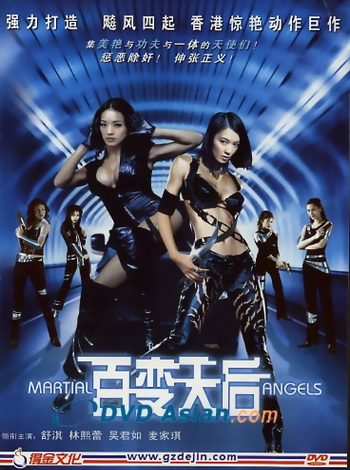
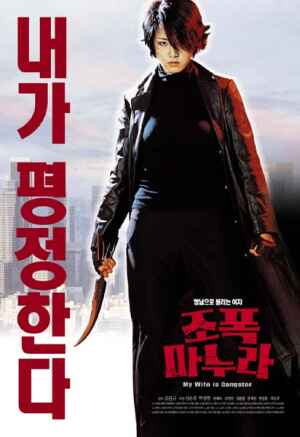 Another slightly clunky Korean title (see also Guns & Talks), but the first forty minutes or so of this are about the driest comedy/action you could ever hope to see. In order to fulfill the wish of her terminally-ill sister, mob boss Eu-jin (Shin), or “Mantis” as she is known, decides she to get married. Of course, she needs an especially stupid husband who won’t realise her true occupation, and finds one in Soo-il (Park), a civil servant with a 0% success rate on his blind dates. Their courtship, pre-nuptials and wedding (the last interrupted by a rival gang – a “martial arts demonstration”, as a fast-thinking sidekick calls it) are executed perfectly, largely thanks to Shin and her expressions of shock and horror at the mating game.
Another slightly clunky Korean title (see also Guns & Talks), but the first forty minutes or so of this are about the driest comedy/action you could ever hope to see. In order to fulfill the wish of her terminally-ill sister, mob boss Eu-jin (Shin), or “Mantis” as she is known, decides she to get married. Of course, she needs an especially stupid husband who won’t realise her true occupation, and finds one in Soo-il (Park), a civil servant with a 0% success rate on his blind dates. Their courtship, pre-nuptials and wedding (the last interrupted by a rival gang – a “martial arts demonstration”, as a fast-thinking sidekick calls it) are executed perfectly, largely thanks to Shin and her expressions of shock and horror at the mating game.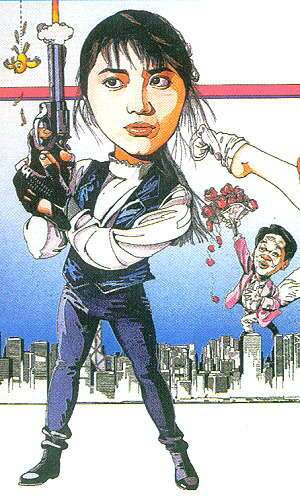 I have a headache. I want to lie down in a dark room, far from shrieking Chinese comedy harridans, incomprehensible plot twists and dialogue that loses
I have a headache. I want to lie down in a dark room, far from shrieking Chinese comedy harridans, incomprehensible plot twists and dialogue that loses 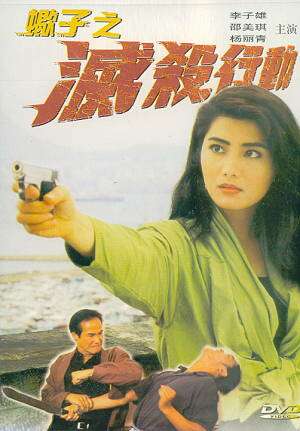 Look at the picture. Note the complete lack of an English language title; I’ve heard of directors taking their name off a movie, but never the film’s name. Also notice the undeniable presence of Cynthia Khan: she is in the film for the first three minutes (in a scene lifted from Nikita), then vanishes without plausible explanation. It’s almost as if she quit the movie after one day, being replaced by Shaw, but they kept the footage shot of her.
Look at the picture. Note the complete lack of an English language title; I’ve heard of directors taking their name off a movie, but never the film’s name. Also notice the undeniable presence of Cynthia Khan: she is in the film for the first three minutes (in a scene lifted from Nikita), then vanishes without plausible explanation. It’s almost as if she quit the movie after one day, being replaced by Shaw, but they kept the footage shot of her.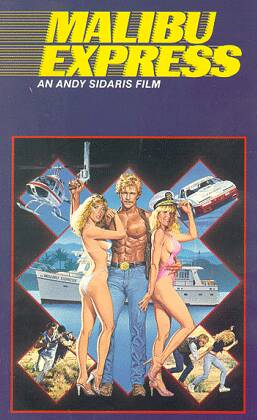 Female action fans would be well advised to give this a wide berth. Actually, so should everyone else, unless they’re fans of crass sexism, extremely clunky exposition and hideous country & western. Cody Abilene (Hinton) is a PI hired by Countess Luciana (Danning) to look into the export of illegal computer technology to the Russians, centred on the home of Lady Lillian Chamberlain. Who is responsible? Oversexed chauffeur Shane? Daughters Lisa and Anita? Or the maid, Marion? [groan…]
Female action fans would be well advised to give this a wide berth. Actually, so should everyone else, unless they’re fans of crass sexism, extremely clunky exposition and hideous country & western. Cody Abilene (Hinton) is a PI hired by Countess Luciana (Danning) to look into the export of illegal computer technology to the Russians, centred on the home of Lady Lillian Chamberlain. Who is responsible? Oversexed chauffeur Shane? Daughters Lisa and Anita? Or the maid, Marion? [groan…]